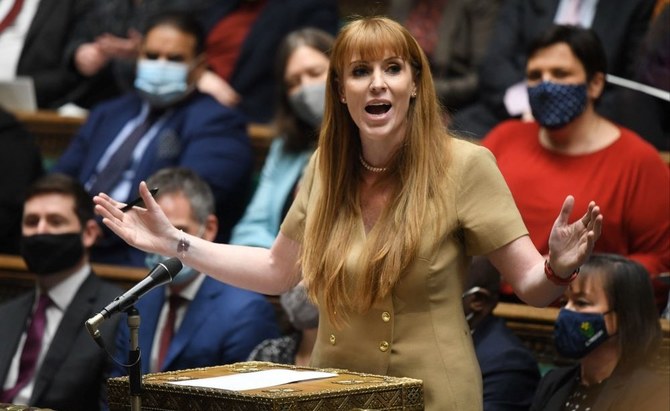
In basketball in the US, the time between when a score is beyond the ability of the team chasing it to close the gap and the end of the game is known as “garbage time.” In British politics, the period between now and the next general election feels very much the same.
The election date is yet to be set, but it cannot by law be any later than January of next year, although the Westminster village is inundated with rumors that it might be as early as July or, at the latest, some time in the autumn. But what is it that makes it feel like the ruling Conservative Party is merely running down the clock until it asks the public for its verdict on its 14-year stay in power, with no hope of winning the next general election?
Keir Starmer’s Labour Party has been consistently ahead in the polls since the start of 2022. This month, 43 percent of British adults said they would vote for the Labour Party in a general election, compared with 23 percent who would vote Conservative. This is an unassailable lead that is beyond the government’s ability to overturn in such a short time, especially considering how divided the party is. And it would be equally difficult for Labour, under the highly cautious leadership of Starmer, to antagonize the electorate to the extent of losing such a massive advantage.
A series of by-elections has already demonstrated voters’ distaste for the current government. However, this state of affairs leads me to suggest, perhaps naively, that the only way for the Conservative Party and its leader, Rishi Sunak, to limit some of the expected damage at the ballot box is to acknowledge its unpopularity and its past mistakes instead of denying or defending them and to show some contrition and humility.
Meanwhile, for Labour and Starmer, there is a golden opportunity, which has been ignored thus far, to present the public with new, radical and innovative policies that can take the UK forward in the post-Brexit era, in contrast with the mediocre and parochial agenda of the current government. This would be instead of just some tweaking at the margins when it comes to the economy, social services, relations with Europe, foreign and defense policies and the divisive issue of immigration, which is dominating the headlines.
After almost 14 years in power and five prime ministers, the Conservative Party is in complete disarray and is utterly bereft of ideas. But the problem is not only its inability to address any of the policy issues that the country faces and the public cares about. It is also the moral corruption and misbehavior of some of its parliamentarians, which characterizes a party that has long overstayed its welcome in government.
The expectation that the prime minister will call an election before the year is out has effectively begun the election campaign. Much of it regrettably features personal attacks and smear campaigns, while the much-needed debates over dealing with a slow-growing economy that is haunted by inflation and a country increasingly becoming another medium-sized power with an island mentality are sidelined.
For the UK, the challenges are mounting at home and there have been no adequate responses from the government. Meanwhile, international affairs are turning into what is widely agreed to be a new cold war, with the present danger of a regional war in the Middle East and tensions with China over trade and the South China Sea that could lead to military confrontation. Then there is the war in Ukraine, which is far from over. And not forgetting the losing battle to mitigate climate change. Astonishingly, despite all of this, the Tories and the right-wing media are instead more concerned with the living arrangements of Labour’s deputy leader Angela Rayner.
In the grand scheme of the British people’s everyday concerns, let alone those of the rest of the world, the issue of whether Rayner’s “main residence” was the one owned by her or the one owned by her husband — and should she therefore have paid £3,500 ($4,300) in capital gains tax when she sold her former council flat — is of negligible importance. After all, Rayner has already announced that, if she is found to have broken the law, she will resign.
But the Tories, despite themselves being beset by scandal after scandal that have forced a number of their MPs to resign — and seen the party lose heavily in the subsequent by-elections — seem to think that clutching at straws, as in their feeble attempts to demonize Rayner, is better than no response at all.
That affair epitomizes the detachment of the party from the daily realities of the British people, who continue to pay for both the disastrous Brexit and the following calamitous application of “Trussonomics,” the brainchild of the shameless 49-day Prime Minister Liz Truss, who continues to promote these harmful ideas (along with her absurd conspiracy theories) in her new book, while the government is now headed by the fifth Conservative PM since 2010.
The Tories love to hate Rayner, first and foremost because she is the hardest hitter on the opposition benches, who demonstrates more clearly than anyone else at the despatch box that their time in government is up. They dread it when she deputizes for Starmer at Prime Minister’s Questions. But their attacks and their efforts to discredit her and push her out of parliamentary politics are both misogynist and class-based.
The very idea that she might hold an influential position in a future Labour government when she comes from a working-class background, grew up on a council estate, does not have a degree from a posh university and became a mother at the age of 16, is unthinkable for the Tories and their supporters. It unnerves their narrow, elitist view of British society and their deep-seated sense of being born to rule.
The Tories love to hate Rayner, first and foremost because she is the hardest hitter on the opposition benches.
Yossi Mekelberg
Time will tell what the police investigation into Rayner’s affairs may or may not discover, but by going after her, the Conservatives are showing they are running scared of the forthcoming general election and that any deflection from their appalling record is welcome.
However, all this achieves is, at best, a few cheers from their ever-shrinking base and some supportive headlines from their client right-wing media. It fails to dissuade the public from wanting a change and wanting it now. Political skirmishes that become very personal ultimately do not shorten waiting lists to see your local doctor or get specialist medical help, they do not create jobs or make housing, food or transport more affordable, and they prevent the country from meeting its climate change targets.
The public is longing not for mudslinging, but for an end to this garbage time and for a grown-up politics that is inclusive and addresses these real issues.
Yossi Mekelberg is a professor of international relations and an associate fellow of the Middle East and North Africa Program at international affairs think tank Chatham House. X: @YMekelberg












